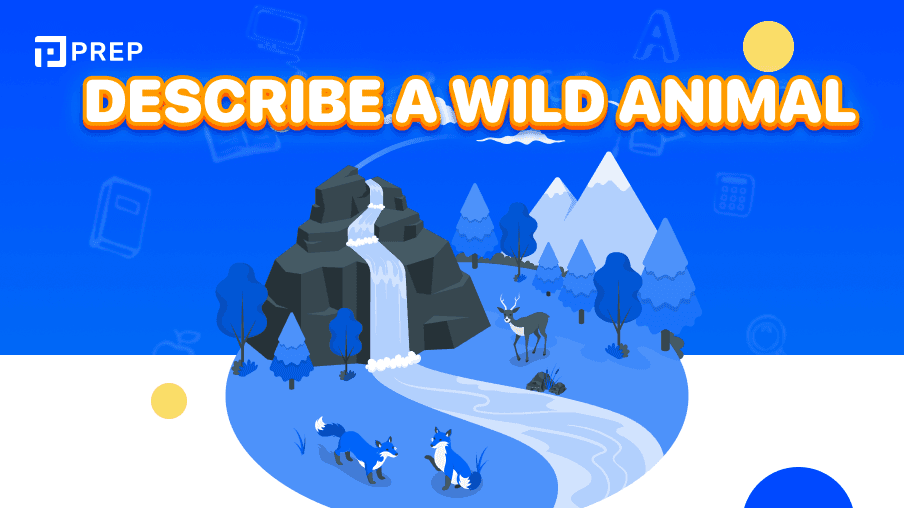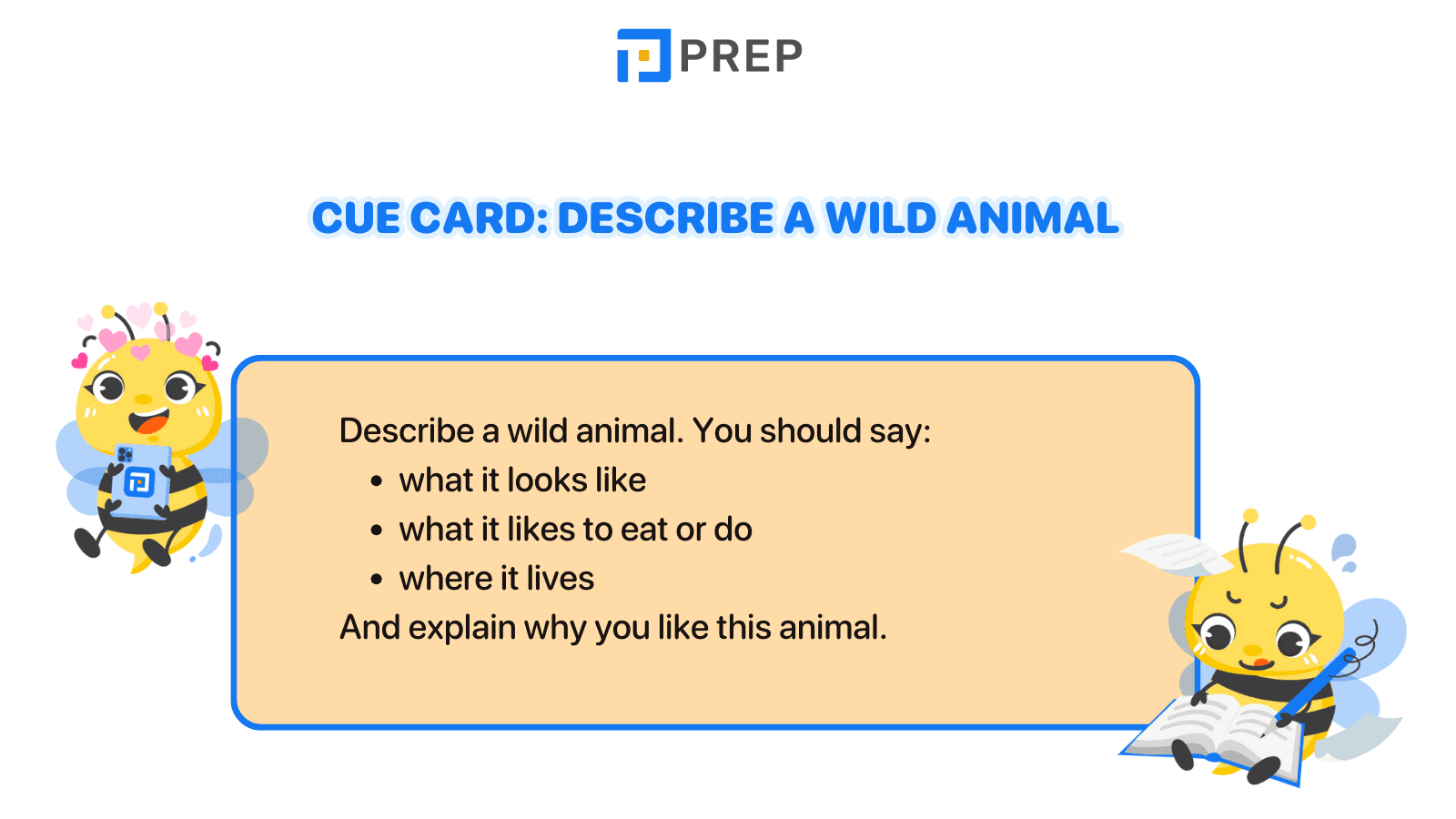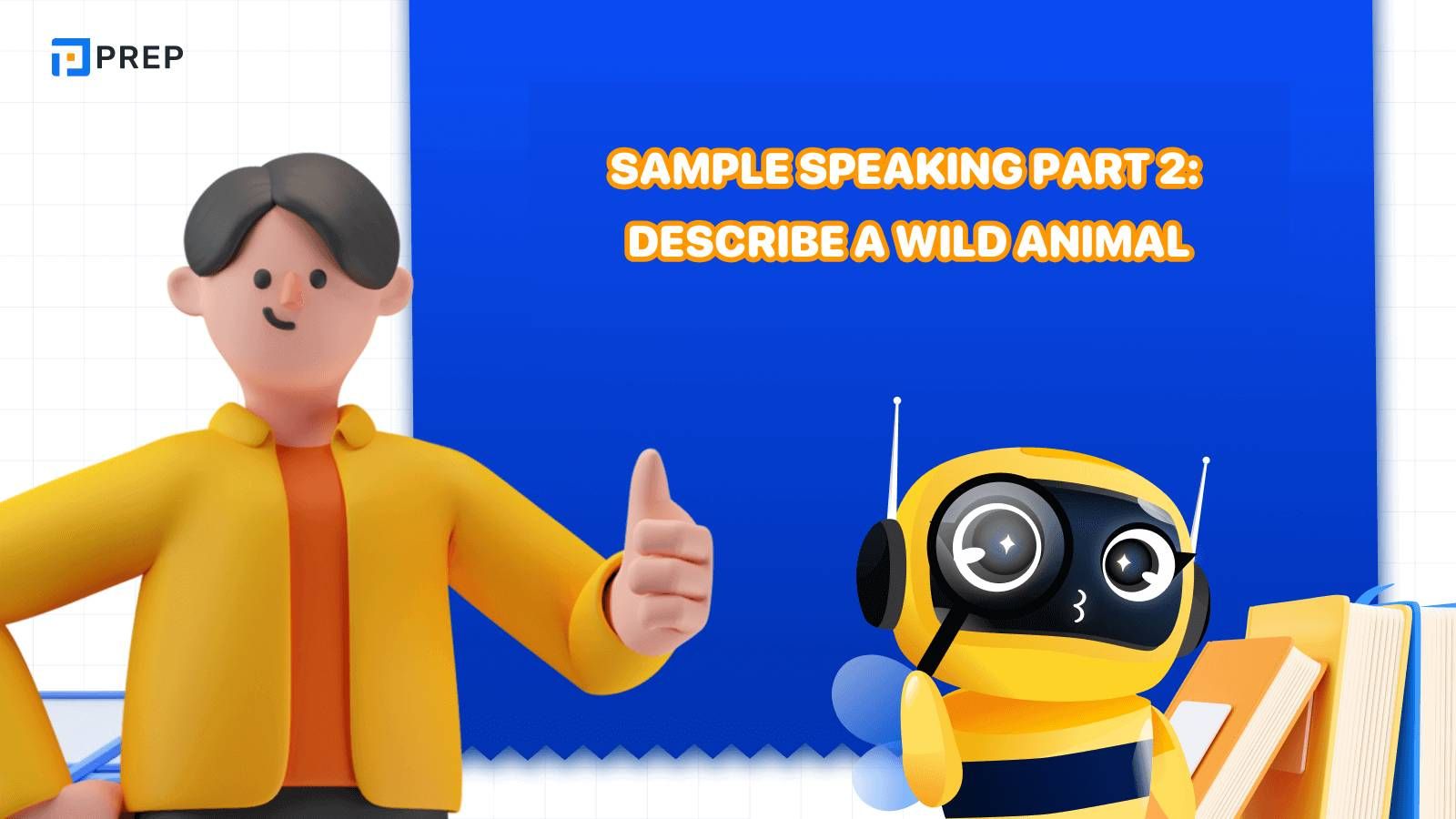IELTS Speaking Part 2, 3 Sample: Describe a wild animal
"Describing a wild animal" is a frequent IELTS Speaking Part 2 task. Below, you'll find an outline, sample ideas, note-taking strategies for one minute, a detailed speaking sample, and useful vocabulary. Review this article to practice IELTS Speaking effectively at home. Additionally, this sample can be easily adapted to similar prompts such as: "Describe a wild animal from your country" or "Describe a wild animal that you have seen."

I. IELTS Speaking Part 2 question and answer: Describe a wild animal
1. Cue card: Describe a wild animal
Describe a wild animal. You should say:
-
what it looks like
-
what it likes to eat or do
-
where it lives
And explain why you like this animal.

2. Outline: Part 2
2.1. Sample idea
The "Describe a wild animal" task requires describing any wild animal. Therefore, you can mention the name of your favorite wild animal, or any wild animal you are familiar with. Some key information to include about wild animals in general:
-
What does it look like?
-
What does it like to eat and do?
-
Where does it live?
-
Explain why you like/mention this animal.
-
As a first step, to make the speech easier and more convincing, choose familiar wild animals that you have had certain experiences with.
-
For the appearance question in the "Describe a wild animal" task, you can provide general information such as size, height, weight, color, and distinctive features of the animal.
-
For the food question, you can divide them into carnivores and herbivores, and mention some specific types of food they usually eat.
-
For the activities, you can mention some of the daily activities of the animal. For this part, you can draw a connection to the two types of animals (carnivores and herbivores) you divided earlier (e.g. for carnivores, they will spend most of their time hunting for prey).
-
Next, you need to provide information about the wild animal's habitat in the "Describe a wild animal" task. In this part, you don't need to be too detailed, just conclude it in 1-2 sentences. You can list some nouns that indicate the locations where these animals live.
-
Finally, you need to analyze why you like or mention this wild animal. To conclude the "Describe a wild animal" response, you can express your plans, desires, or emotions.
2.2. One-minute note-taking
|
Appearance |
|
|
Food & Activities |
|
|
Habitats |
|
|
Why? |
|
3. IELTS Speaking Task 2 samples: Describe a wild animal
The following is a IELTS Speaking Part 2 answer on the topic "Describe a wild animal" compiled by the teachers at PREP. Take a look at the article below to learn IELTS online effectively.

Let's take a look at IELTS Part 2 Speaking examples - Describe a wild animal:
Today I am going to tell you about my perennial favorite wild animal. To be honest, I would consider myself a bit of a nature nerd, and naturally, I got particularly excited when talking about animals, one of which is the elephant.
In terms of appearance, elephants are recorded as the current largest living land animal, characterized by their grayish body, long trunks, columnar legs, and a massive head with flat ears. An average Asian elephant which can also be found in Vietnam, can weigh up to 6000 kg and stands 3 to 4 meters at the shoulder. Such animals are mostly found in savannas, grasslands, forests, and deserts. But let's be honest, the most common way where one can meet a real-life elephant is in the zoo, sadly.
Another thing about this kind of animal is that it's a herbivore which means they feed primarily on different plants, ranging from grasses and fruits to roots. An adult elephant can consume about 100 kg of food and 100 liters of water daily. Elephants are no predators; hence their daily activities are pretty chill. They are considered highly intelligent and social animals who would spend their day socializing, playing water games, or even playing football.
All in all, their energy and friendliness are what I got hooked on at first. Despite my poor interaction with elephants, my love and interest for them grow beyond the zoo.
The following are some of the useful vocabulary used in the sample IELTS Speaking Part 2 Describe a wild animal:
-
Perennial favorite: something that is always popular
-
Nature nerd: a person who loves nature (Noun + nerd: a person who loves...)
-
Characterized by: described or represented by
-
Trunk (noun): the elephant's nose/snout
-
Columnar (adj): shaped like a column
-
Herbivore (noun): an animal that eats plants
-
Feed on = eat (verb): to consume
-
Get hooked on (sth): to become very interested in/attracted to something
II. Sample IELTS Speaking Part 3: Protecting animals
Let's listen to the Podcast sample of IELTS Speaking Part 3 - Protecting animals:
1. Do you think people treat wild animals well in your country?
As much as I care about wildlife, I’m no expert in this. The problem of protecting wild animals and their habitats has just emerged in recent years among Vietnamese people. Despite being taught various lessons about preserving and protecting wildlife, young people’s experience with such ideas is still very vague since their only interactions with wild creatures are through TV screens.
Or another way where we can learn more about these animals is at the zoo, which I personally believe is prisoning rather than protecting them.
-
Be no expert in: not an expert in a certain field
-
Emerge (v): to come into view or prominence
-
Preserve (v): to protect from harm or decay
-
Vague (a): uncertain, indefinite, or inexact
-
Prison (v): to imprison, confine, or restrict
2. Do you think it is important to spend money on protecting rare or endangered species?
By all means. Animals in general and endangered ones in particular play a vital role in maintaining ecological balance. If rare species are to be extinct, the whole food chain will be disrupted as this type of animal depends closely on the other.
Without one, the disappearance of this kind may eventually lead to many others related to the food chain, which could be seen as a global catastrophe. As a result, much money must be spent on preserving and breeding such endangered species.
-
By all means = definitely yes
-
Ecological balance: the balance of an ecosystem
-
Extinct (a): no longer existing
-
Food chain: the hierarchy of organisms feeding on one another
-
Disrupt (v): to interfere with or interrupt the normal progress or functioning of
-
Catastrophe (n): a sudden and widespread disaster
-
Breed (v): to produce offspring
3. What measures might be taken to protect endangered species from extinction?
There are a number of actions that can be taken to protect the creatures facing the threat of extinction. The first step involves all citizens actively supporting and participating in campaigns against illegal hunting and poaching, which are believed to be the leading cause of the problem.
At the same time, in addition to significant investments for conserving and breeding wild animals, the government should also introduce stricter regulations that impose proper punishments on those who engage in illegal poaching activities.
-
Extinction (n): the state or process of a species of animal or plant dying out
-
Campaign (n): an organized course of action to achieve a goal
-
Illegal (a): not permitted by law
-
Poaching (v): to hunt or catch (game or fish) illegally on land that is not one's own
-
Leading = main (a): most important; principal
-
Conserve (v) = preserve (v): to protect from harm or decay
-
Introduce regulation: to implement new rules or policies
-
Strict (a): rigid, severe, or demanding
-
Impose (punishment on): to levy or apply (a penalty) on
This is the most detailed sample IELTS Speaking Part 2, 3 on the topic of "Describe a wild animal" written by the teachers at PREP. Refer to this article to practice for the IELTS exam effectively!

Hi I'm Chloe, and I am currently serving as an Product Content Administrator at Prep Education. With over five years of experience in independent online IELTS study and exam preparation, I am confident in my ability to support learners in achieving their highest possible scores.
Comment
Premium content
View allPersonalized roadmap
Most read












